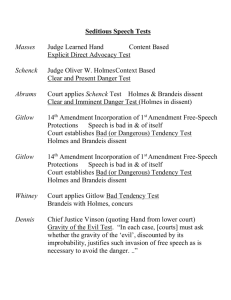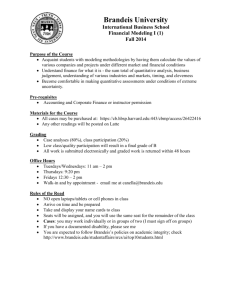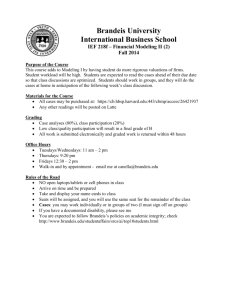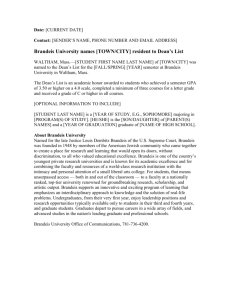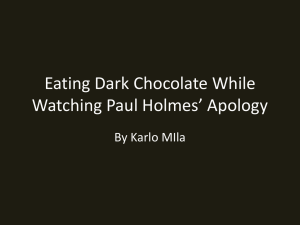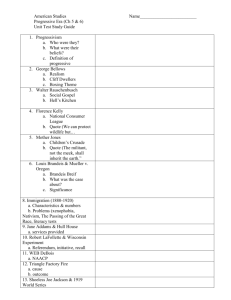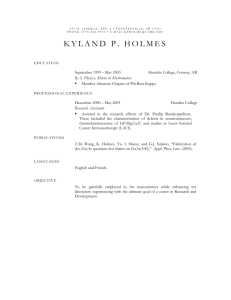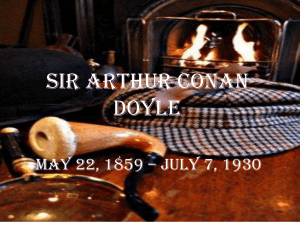01_02_DPB
advertisement
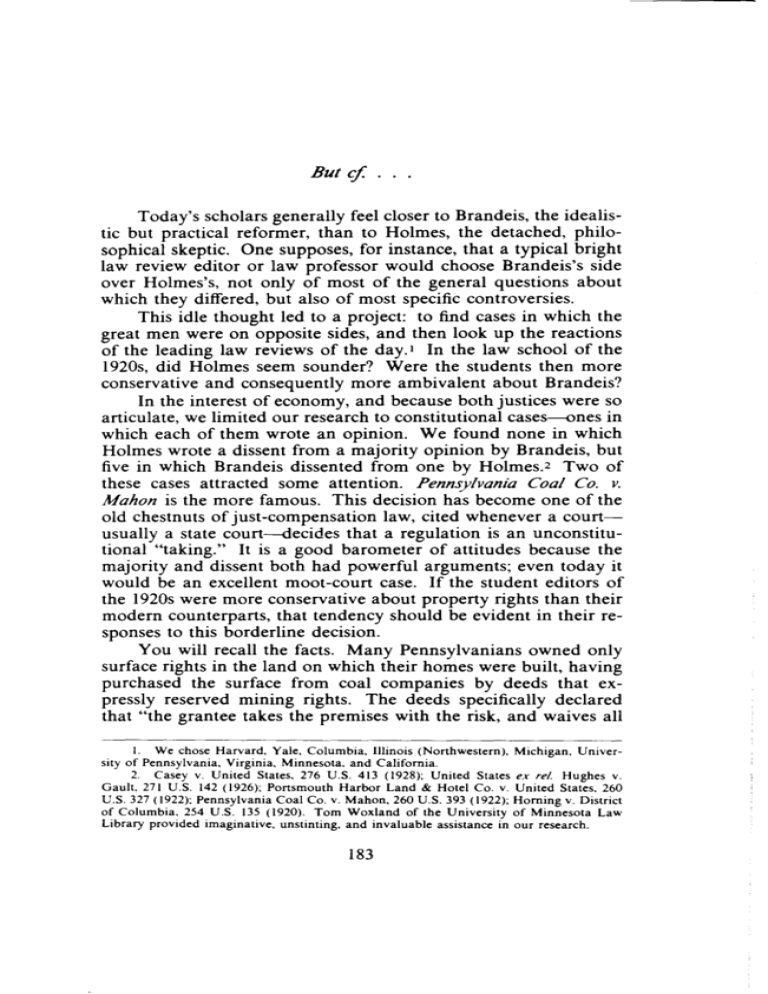
But if. ... Today's scholars generally feel closer to Brandeis, the idealistic but practical reformer, than to Holmes, the detached, philosophical skeptic. One supposes, for instance, that a typical bright law review editor or law professor would choose Brandeis's side over Holmes's, not only of most of the general questions about which they differed, but also of most specific controversies. This idle thought led to a project: to find cases in which the great men were on opposite sides, and then look up the reactions of the leading law reviews of the day. I In the law school of the 1920s, did Holmes seem sounder? Were the students then more conservative and consequently more ambivalent about Brandeis? In the interest of economy, and because both justices were so articulate, we limited our research to constitutional cases--ones in which each of them wrote an opinion. We found none in which Holmes wrote a dissent from a majority opinion by Brandeis, but five in which Brandeis dissented from one by Holmes.2 Two of these cases attracted some attention. Pennsylvania Coal Co. v. Mahon is the more famous. This decision has become one of the old chestnuts of just-compensation law, cited whenever a courtusually a state court---<lecides that a regulation is an unconstitutional "taking." It is a good barometer of attitudes because the majority and dissent both had powerful arguments; even today it would be an excellent moot-court case. If the student editors of the 1920s were more conservative about property rights than their modern counterparts, that tendency should be evident in their responses to this borderline decision. You will recall the facts. Many Pennsylvanians owned only surface rights in the land on which their homes were built, having purchased the surface from coal companies by deeds that expressly reserved mining rights. The deeds specifically declared that "the grantee takes the premises with the risk, and waives all I. We chose Harvard, Yale, Columbia, Illinois (Northwestern), Michigan, University of Pennsylvania. Virginia, Minnesota. and California. 2. Casey v. United States, 276 U.S. 413 (1928); United States ex rei. Hughes v. Gault. 271 U.S. 142 (1926); Portsmouth Harbor Land & Hotel Co. v. United States. 260 U.S. 327 (1922); Pennsylvania Coal Co. v. Mahon, 260 U.S. 393 (1922); Horning v. District of Columbia, 254 U.S. 135 (1920). Tom Woxland of the University of Minnesota Law Library provided imaginative. unstinting, and invaluable assistance in our research. 183 184 CONSTITUTIONAL COMMENTARY [Vol. 1:183 claim for damages that may arise from mining out the coal."J The state legislature subsequently passed a law forbidding coal mining wherever it would cause the subsidence of residences. In an opinion by Holmes, the Court held that this law was a taking of the company's subsurface property rights and as such unconstitutional without compensation. Brandeis wrote a strong dissent. Constitutional experts were divided about this case. Professor Frankfurter privately agreed with Brandeis.4 But Thomas Reed Powell sided with Holmes, calling the case a classic illustration of the difference between "reasoning" and "reasonableness." Brandeis's dissent "moves skillfully step by step, and no single step is stretch enough to cause a stumble. Yet the journey as a whole takes us beyond the point at which reasonableness would naturally call a halt."s What did the Harvard Law Review's editors, in the days of Landis and Leach, have to say? The Review's student commentator came at the case from a political angle.6 Citing Cardozo's Nature of the Judicial Process, he wrote that "[t]his case illustrates strikingly how much the determination of the extent to which a state may go in restricting the use of property or the enforcement of contracts depends upon considerations of statesmanship." Since neither the constitutional text nor precedent is helpful here, "[p]erhaps their own economic or social views control" the judges, citing Cardozo again. "Thus, the majority opinion minimizes the public danger involved, and treats the statute as designed primarily to enhance property values at the expense of the coal owners," while "[t]he dissent, on the other hand, emphasizes the weight to be accorded the findings of the state legislature and court as to the existence of an emergency, and considers the public safety rather than property values as the primary object of the legislative protection. . . . The difference in result thus reached would indicate that a state may perhaps go farther to protect the lives and health of its people than to secure their interests of substance." The Yale Law Review disposed of Pennsylvania Coal in a short paragraph.? As at Harvard, the student author supposed 3. 260 U.S. at 412. 4. M. PARRISH, fELIX fRANKFURTER AND His TIMES: THE REFORM YEARS 167 (1982). However, Professor Parrish's citation for this (footnote 63) is obviously incorrect. He believes that the last authority cited in footnote 62 would be correct. 5. Powell, Reasoning, Reasonableness and the Pennsylvania Surface Subsidence Case, I N.Y. L. REV. 242, 243 (1923). 6. 36 HARV. L. REV. 753-54 (1923). 7. 32 YALE L.J. 511 (1923). 1984] EDITOR'S NOTE 185 that the decision had been determined by extralegal considerations. His authority for such "realism" was the master himself: Again the articulate social policy of a legislature is defeated by the "inarticulate major premise" of the courts. See Holmes Path of the Law. In view of the minority opinion in the instant case and the majority opinion in the state court, there would seem to be ample precedent to support this statute. The decision may be another indication of a recent tendency to narrow the scope of legislative power, which is perhaps to be expected after the extended emergency limits of war time. Several major law reviews ignored Pennsylvania Coa/.B Pennsylvania noted the case after the state court's decision, which it supported.9 Virginia's discussion was noncommittal. 10 To Minnesota's student author, the result was "in accord with settled principles."11 "The real test is one of reasonableness, taking into consideration both the public interest and the degree of regulation." In a fine display of Scandinavian reserve, he declined to argue further. The Cal!fornia Law Review's analysis began by discussing some precedents, observing that the flexibility of judicial responses to just compensation issues had "left room for progressive measures, while indicating the existence of some constitutional limitation." 12 The Pennsylvania Coal opinion "is of particular significance, in that Justice Holmes had been considered by some to be the proponent of modern views ...." To Holmes, "the statute is neither justified as a protection of public safety nor imbued with a public interest." This view, however, "does not seem to do justice to the facts." Holmes had contended that the fact that the homeowners' "risk has become a danger" does not warrant "giving to them of greater rights than they bought." The student author was unpersuaded. "The answer to this," he declared, "is best presented by the dissent which indicates the very apparent public interest and denies the existence of an individual or public capacity to contract away or affect the state's right to regulate under the police power." Furthermore, "the decisions indicated by the dissent, in which the fact that eminent domain was possible was held not to preclude the exercise of the police power, seem undistinguishable." Finally, "[i]f mining could be continued at all with profit" the case seems indistinguishable from zoning and other restrictions that have been upheld. 8. 9. 10. II. 12. We found no case notes in Columbia, Illinois (now Northwestern), or Michigan. 71 U. PA. L. REv. 77 (1922). 9 VA. L. REV. 457 (1923). 7 MINN. L. REV. 242-43 (1923). II CALIF. L. REV. 188-91 (1923). 186 CONSTITUTIONAL COMMENTARY [Vol. 1:183 The decision did not go completely unnoticed by the general press. The New Republic's anonymous editorial on the casel3 apparently was written by Dean Acheson, who had been Brandeis's Secretary during the 1919-20 Term.I4 Like the student authors at Harvard and Yale, he saw Pennsylvania Coal as "an outstanding illustration of the way in which fundamental constitutional decisions depend at bottom not upon ascertainable rules of law but upon personal judgment," citing-you guessed it-Justice Holmes. Holmes and Brandeis both argued "without logical flaw" from their respective premises, and "[t]he decision depends on the act of judgment in choosing between the premises." Brandeis, however, had the better precedents: "Certainly it would seem that the invasion of the rights of the coal owners in their coal was no greater than the invasion of the rights of the owners of liquor by the Volstead Act." Yet precedents are not ultimately controlling: [T]he Court has always the power to do as it frankly did here and in the Child Labor Case----call a halt in the trend of the law's development based solely upon its own conceptions of public policy. It is a supreme act of statesmanship, which under the Constitution has become the function of the Court, and it is far more important for the American people to recognize this and insist that the men who are to exercise the power truly represent the American democracy than it is to criticize any particular exercise of the power. This said, Acheson concluded that "Justice Brandeis's view seems the superior statesmanship." For "as this spinning globe comes to have living upon it more and more human beings, it is inevitable that the freedom of action of these individuals must become more and more limited." After all, "property rights of the kind here in question are, as Justice Holmes has himself well said, merely rights to course of conduct." The social risk of suspending mining "under cities until the development of science permitted it to be safely done would be less than in burdening the government with the cost of buying outright all rights in the subsoil." Taxes, like regulations, "discourage individual initiative." Three of the remaining cases in which Holmes and Brandeis disagreed turned out to be less interesting, but we did find a nice criminal procedure case with constitutional overtones. In Horning v. District of Columbia the defendant was convicted of the crime of doing business as a pawnbroker in the District without a license. He had admitted moving his loan office into Virginia, maintaining a reception office in the District, and conducting 13. NEW REPUBLIC, Jan. 3, 1923, at 136, 136-37. 14. See I HOLMES-LASKI LETTERS 473 n.4 (M. Howe ed. 1953). 1984] EDITOR'S NOTE 187 about fifty to seventy-five patrons a day across the line by automobile, in order to evade the D.C. statute. The trial judge instructed the jury that the undisputed facts constituted a violation of the law; that failure to convict would evince a "wilful and flagrant disregard of the evidence and the law"; and that acquittal would be a "violation of your obligation as jurors." Although "I cannot tell you in so many words, to find defendant guilty," he concluded, "what I say amounts to that." On behalf of a majority of five, Holmes pointed out that where the facts are not in dispute, "obviously the function of the jury if they do their duty is little more than formal." To be sure, the judge may not direct a verdict and the jury may bring in a verdict "in the teeth of both law and facts." But the judge must explain the application of the law to whatever state of facts the jury may find; he is no less entitled to do so when the facts are agreed. "Perhaps there was a regrettable peremptoriness of tone" but the jury "were allowed the technical right, if it can be called so, to decide against the law and the facts." If "the defendant suffered any wrong it was purely formal" since "on the facts admitted there was no doubt of his guilt." Is Justice McReynolds dissented without opinion, and Justice Brandeis wrote a dissent in which Chief Justice White and Justice Day joined.I6 Brandeis's opinion began with the proposition that although a judge may comment freely on the evidence, he may not direct a verdict of guilty in a criminal case even when the facts are undisputed. "What a judge is forbidden to do directly, he may not do by indirection." While he may "enlighten the understanding of the jury and thereby influence their judgment," he "may not use undue influence." He may "persuade" but not "command or coerce." Here the instruction was a "moral command" and therefore improper. Given the constitutional right to a jury trial, such an error is not merely formal. Of our sample of law reviews, five noted this decision. The discussions in Minnesota and Michigan were inconclusive. Yale's author said that the decision was in accordance with "the modern tendency" ainong state courts.n "[I]t is proper for the court to warn the jury against exercising their power of disregarding the law and the evidence in violation of their moral duty, and . . . no substantive rights of the defendant are violated, as it is not to be 15. 254 U.S. at 138-39. 16. /d. at 139-40. 17. 30 YALE L.J. 421 (1921). 188 CONSTITUTIONAL COMMENTARY [Vol. 1:183 presumed that a jury will find in opposition to the law from mere whim, caprice, or prejudice, for all their power to do so." Harvard's author disliked the decision. Since the instruction "was clearly coercive," the verdict "was not the free decision of the jury."ts The Court's decision, therefore, reached "the questionable result of allowing a presiding judge indirectly to compel a verdict of guilty." Since the accused's actual guilt would not justify a literal directed verdict, it also does not justify this sort of compulsion. The Columbia Law Review scornfully dismissed Holmes's reasoning: t9 [T]he court is not privileged to direct a verdict indirectly, any more than directly. In the instant case, that the charge might well have unduly influenced the jury is obvious. Moreover, the distinction which the majority opinion attempts to draw between a charge which directs a verdict in so many words and a charge which 'amounts to' a directed verdict is absurd. Agreeing with Brandeis, the editor rejected the idea that only a technical right was involved, pointing out that trial by jury is guaranteed by the Constitution. It is interesting to compare the formalism of the Horning opinions and commentary with the self-conscious and facile realism of the reactions to Pennsylvania Coal. The proper disposition of a just compensation case, we are told, requires "statesmanship" about property, while a criminal procedure case should be resolved by syllogisms about rights. The dissenters' view in Horning ultimately became the law. But it was hardly due to inescapable logic. Notwithstanding the maxim cited by Justice Brandeis, much of life involves doing indirectly what the law forbids us to do directly. The analogy to a directed verdict in Horning was no more irresistible than the analogy in Pennsylvania Coal to a literal expropriation. In deciding how forcefully a judge should be allowed to exhort the jurors to follow the law when the facts are undisputed and guilt is clear, the real question is whether to interpret the rule against directed verdicts narrowly or expansively. Neither of the jurists, and none of the student commentators, even alluded to the possibility of answering this question by weighing the pros and cons of jury nullification. Of course, one shouldn't be too smug about this sort of thing. We all rely on ipse dixits. In the 1920s, judges were still expected to be oracular, and student editors reportorial. Both classes had 18. 19. 34 21 HARV. L. REV. 442, 443 (1921). L. REV. 190, 191 (1921). COLUM. 1984] EDITOR'S NOTE 189 only just begun to realize that their true vocation 1s to write treatises. No firm conclusions should be drawn from our tiny sample of reactions to Pennsylvania Coal and Horning. They are, however, some evidence that the attitudes of editors in the twenties did not differ much from those of their grandchildren. They brought less learning to bear on the cases, because less was available. But they did not need an environmental movement, or a Great Depression, to convince them that property rights should yield to the state. And in criminal procedure, too, they sound thoroughly modern. D.P.B.
